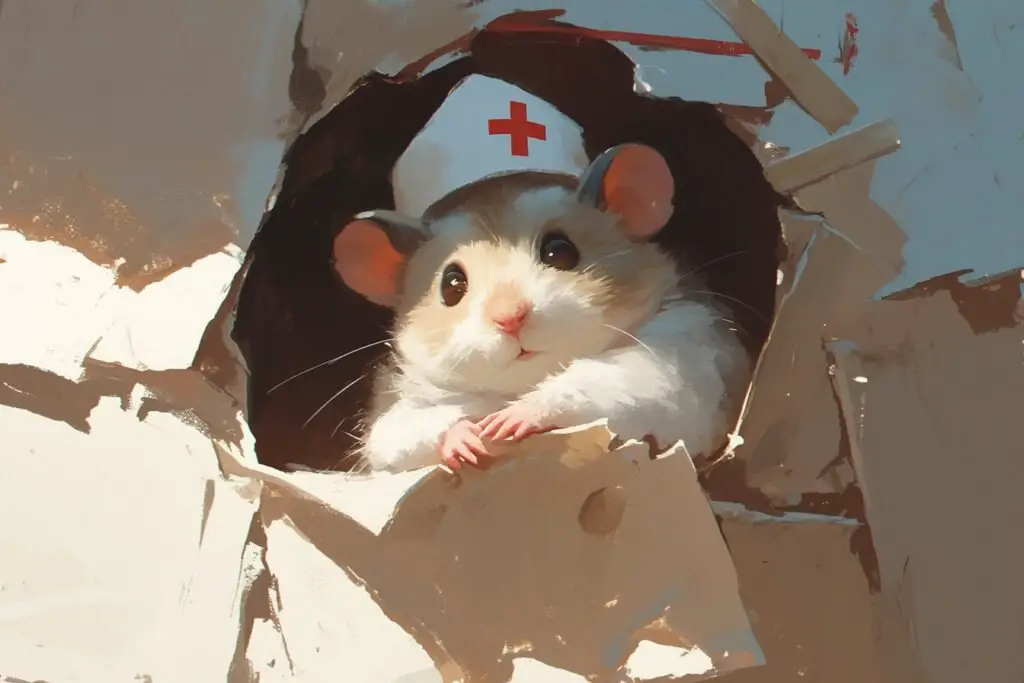You brought home a new fellow, expecting years of companionship, but now you’re left wondering why your hamster passed away after just a few months. You’re not alone – many owners face this sad reality.
But before you blame yourself or the pet store, understand that there are some hidden culprits at play. From questionable breeders to hidden health issues. The reasons behind your hamster’s untimely death are more complex than you might think. Want to know the real deal? 👇
Key Takeaways
- Hamsters from dodgy breeders can have genetic defects and breeding mishaps that shorten their lifespan.
- Environmental stressors, such as temperature fluctuations and overcrowding, can cause hamsters to die prematurely.
- A poor diet lacking essential nutrients can lead to health issues and shorten a hamster’s lifespan.
- Hamsters can have hidden health issues, such as heart disease, that are asymptomatic until it’s too late.
- Accidents, such as getting stuck in cage bars or wheel-related accidents, can cause sudden trauma or injury leading to death.
Genetics and Breeding Factors
Raising hamsters from dodgy breeders is basically playing Russian roulette with their tiny lives, as genetics and breeding factors can be a ticking time bomb waiting to shorten their lifespan.
You’re rolling the dice, hoping your hamster doesn’t inherit some crazy genetic defect that’ll turn it into a furry little time bomb.
And let’s be real, those ‘breeders’ who prioritize profit over animal welfare are playing God with your hamster’s DNA.
They’re cranking out hamsters like they’re on some sort of furry assembly line, without a care in the world about the long-term consequences.
You might think you’re getting a great deal on that adorable hamster, but what you’re getting is a bundle of genetic defects and breeding mishaps just waiting to manifest.
It’s like buying a used car from a shady dealer – it might look great on the surface, but beneath the hood, it’s a hot mess.
If you want to avoid playing hamster roulette, do your research and find a reputable breeder who actually cares about the welfare of their furry friends.
Trust us, your hamster’s life depends on it.
Environmental Stressors
You’ve managed to dodged the genetic bullet by finding a reputable breeder, but now it’s time to face the music: your hamster’s environment can be a ticking time bomb of stressors just waiting to send them six feet under.
Think about it, your tiny furball is stuck in a cage 24/7, surrounded by the same old toys and the same old food. It’s like being trapped in a hamster-sized prison cell.
And don’t even get me started on the temperature fluctuations, loud noises, and pesky siblings who think it’s fun to tap on the glass. These environmental stressors can wreak havoc on your hamster’s delicate system, causing them to freak out, get sick, or worse.
As a hamster owner, it’s your job to create a stress-free zone.
Start by providing a spacious cage with plenty of hiding spots and toys to keep them occupied. Keep the temperature consistent, and make sure they’re not stuck in a noisy area.
And for goodness’ sake, don’t overcrowd them! Your hamster’s small size makes them more susceptible to environmental stressors, so it’s essential to create a peaceful environment that lets them thrive, not just survive.
Hidden Health Issues

Dig deeper into your hamster’s cute exterior, and you might uncover a plethora of hidden health issues that are silently killing them. Yep, it’s like they’re hiding a secret life of chronic illnesses beneath those adorable whiskers.
Heart disease, for instance, is a common hidden health issue in hamsters. It’s like they’re tiny, furry humans with clogged arteries and high blood pressure. Who knew?
These hidden health issues can be inherited or developed over time, and they’re often asymptomatic until it’s too late. You might think your hamster is just being lazy, but in reality, they’re struggling to breathe due to a heart condition. Or, they might be hiding a tumor that’s slowly growing beneath their fur.
It’s like they’re saying, ‘Hey, human, I’m fine, just a little tired… oh, and I’ve a tumor the size of a pea, no big deal.’
The point is, you can’t always spot these hidden health issues just by looking at your hamster. You need to stay vigilant, monitor their behavior, and get them regular check-ups.
It’s better to be proactive than to be left wondering why your hamster died so fast.
Poor Diet and Nutrition
Behind those cute, chubby cheeks, your hamster’s diet is secretly plotting against them, and it’s up to you to stop the nutritional sabotage. You think those adorable hamster treats are harmless, but they’re actually sugar bombs waiting to wreak havoc on your furry friend’s health. And don’t even get me started on the ‘hamster food’ that’s basically just a bag of fillers and by-products. No wonder your hamster is always at the vet’s office!
| Good Diet | Bad Diet |
|---|---|
| Fresh veggies, fruits, and whole grains | High-sugar treats and processed foods |
| 12% protein for healthy kidneys | Excessive protein leading to nephritis |
| Fresh, clean water at all times | Dehydration and organ failure |
A balanced diet is essential for your hamster’s survival. Feed them commercial hamster pellets, fresh veggies, and occasional treats, and make sure they always have access to clean water. A nutritious diet will support their immune system and reduce the risk of disease. So, ditch the junk food and give your hamster the freedom to live a long, healthy life!
Lack of Veterinary Care
You’re basically playing Russian roulette with your hamster’s life by neglecting regular veterinary check-ups, and it’s no wonder they’re dropping like flies. I mean, come on, you’re basically leaving their fate to chance. A study showed that a whopping 79% of hamster owners don’t bother taking their furry friends to the vet until it’s too late. By then, symptoms are severe, and treatment is a long shot.
Here’s the harsh reality:
| Hamster Owner Actions | Consequences | Outcome |
|---|---|---|
| No regular vet visits | Undiagnosed health issues | Sudden Death |
| Ignoring signs of illness | Delayed treatment | Reduced lifespan |
| Lack of awareness | Untreated health problems | High mortality rate |
| No preventive care | Increased risk of disease | Premature death |
| Inadequate care education | Hamster suffering | Unnecessary death |
It’s time to take responsibility for your hamster’s health. Regular veterinary check-ups can detect health issues early. They are improving treatment outcomes and reducing the risk of sudden death. Don’t play roulette with your hamster’s life; take control of their care.
Inherent Health Problems
Your hamster’s dodgy DNA is basically a ticking time bomb, waiting to trigger a host of health problems that’ll have you Googling ‘hamster hospice‘ before you know it.
It’s like they’re born with a ‘best by’ date, and it’s only a matter of time before their inherent health problems kick in. Hamsters are prone to respiratory issues, heart problems, and tumors – yay, fun times!
And let’s not forget about their teeth, which grow continuously and can cause all sorts of problems if they don’t get worn down properly. It’s like they’re set up for failure from the get-go.
You can try to provide the best care possible, but sometimes it’s just not enough. Hamsters die, and it’s often due to these inherent health problems.
It’s not your fault, but it still stings. So, before you bring a new furry friend home, just be aware of the potential health issues that come with the territory.
It’s not all cuddles and squeaks, folks. But hey, that’s just part of the hamster package, right?
Sudden Trauma or Injury

Accidents will happen, and when they do, your hamster’s fragile little body can go from zero to corpse in a heartbeat.
You might be thinking, ‘But I’m a responsible hamster owner! I provide a safe and cozy environment!’ Yeah, good for you. However, even with the best intentions, sudden trauma can still occur.
Your hamster might get its tiny paws stuck in the cage bars, or that pesky wheel might become a death trap. And just like that, your furry friend becomes a statistic – a cause of death due to sudden trauma.
You mightn’t even realize what happened until it’s too late. One minute your hamster is happily munching on food, the next it’s lying lifeless on the cage floor.
This is a harsh reality, but being aware of the risks is crucial.
So, what can you do? Well, for starters, make sure to hamster-proof your cage, and keep a close eye on your pet’s behavior.
It’s not a guarantee, but it might just save your hamster’s life. And if the worst does happen, at least you’ll know that you did everything in your power to prevent it.




